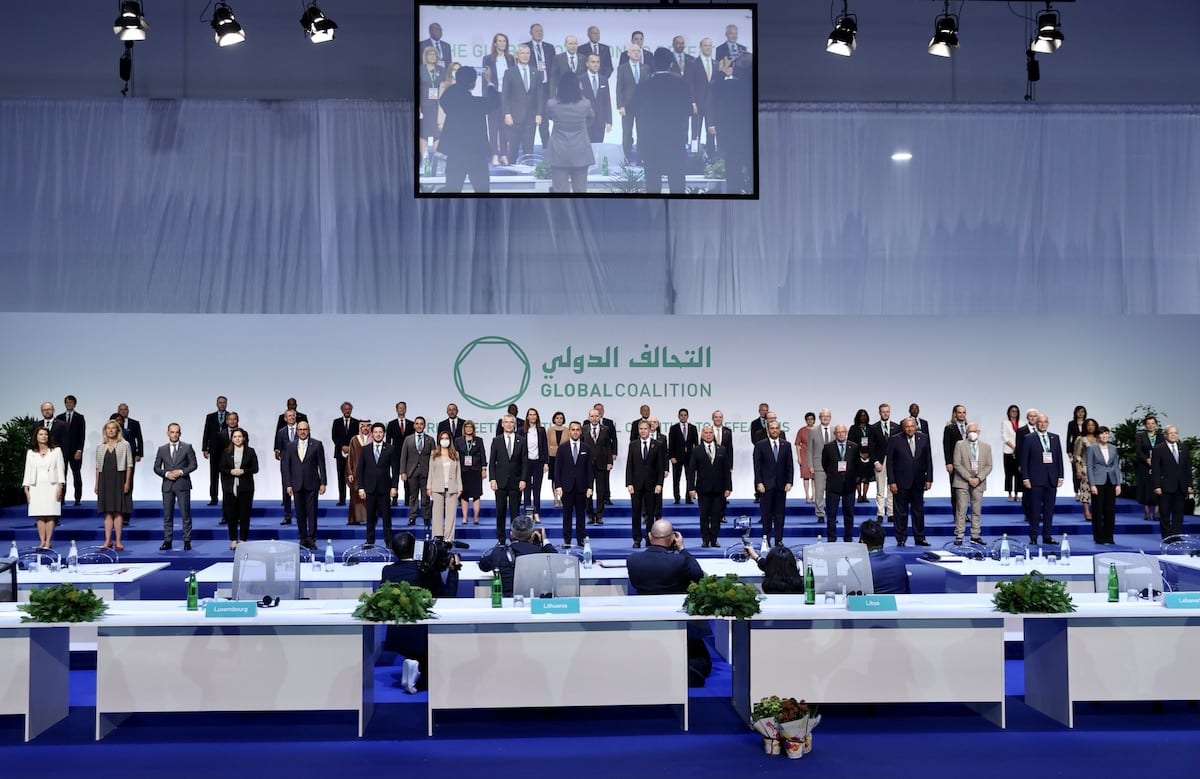European Centre for Counterterrorism and Intelligence Studies
By Dr Mohammed Salah Djemal – Senior Researcher at ECCI

Italy hosted and co-chaired with the United States the plenary ministerial meeting of the International Coalition against ISIS on 28 June in Rome. This is a very important event for the Coalition’s 83 members, more than half of whom will participate at ministerial level, two years after the last full meeting.
The Ministerial Meeting in Rome is an opportunity to reaffirm the cohesion of the coalition to ensure a lasting defeat of Daesh, to reaffirm the common commitment to the stabilisation of the liberated areas in Syria and Iraq, and to strengthen cooperation within the thematic working groups. In addition, as requested by Italy, a large place will be devoted to combating the threat posed by ISIS-affiliated organisations in other regions, in particular in the Sahel and in various regions of Africa, a phenomenon that has grown and becoming dangerous in recent years, and poses serious risks to the security of the Mediterranean region.
The Meeting of Rome: Africa is at the Centre of Discussions
The United States and other Western powers are expanding their coalition by inviting 25 African countries to participate. The African continent, particularly the Sahel and West Africa regions, have been facing a series of threats for several years, including the most emblematic of terrorism and the danger of jihadist groups. These have contributed to the destabilisation of the region and, in some countries, have increased the fragility of the State.
Often, the weakness of democratic institutions and the partially dysfunctional role of the security forces, the absence of security strategies at the national level, the lack of financial resources, as well as conflicts of interest between the various national and international actors prevent the establishment of modernized security structures in order to combat terrorism in the continent.
The International Coalition Expansion in Africa: Backgrounds and Reasons
France recently announced, all of a sudden, the end of Barkhane Operation , which it had launched on its own initiative on 1 August 2014, with the aim of eliminating terrorist groups associated with Al-Qaeda; an operation that included sub-Saharan countries, collectively called the Sahel (Mauritania, Chad, Burkina Faso, Mali and Niger).
In fact, the first major crisis of Barkhane Operation came after the military coup in Mali, when the newly established government – which was not well received by France – announced that it had suspended joint operations with France despite the fact that it was Malian President Moses Traoré who had first asked for French military support. Be that as it may, France suddenly found itself as an undesirable state in Mali, which is very important to it.
The second factor, and probably the most important, is that operations abroad put significant pressure on the budget. As part of the operations, more than 33 thousand soldiers were deployed, 600 aircraft were used and around €1.3 billion was spent in 2016 alone.
The suspension of Barkhan Operation and the withdrawal of France from the Sahel despite the rise of terrorist activities in the region, have raised security concerns among international powers, which are aware of the gravity of the situation in Africa, and its potential impact on the strategic interests of these powers (investments , areas of influence, direct and indirect repercussions on Europe which is geographically close to Africa).
West Africa has formed a fertile ground and environment for the activities of extremist groups, characterized by several factors for the growth of these groups, and fears of a succession of terrorist organizations in West Africa have escalated, especially after several extremist groups spreading allegiance to ISIS, and supporting the idea of the caliphate project, including the Movement for Unity and Jihad, Ansar al-Din.
Is the USA Enthusiastic About Intervening Militarily in Africa to Combat Terrorism as Part of the International Coalition?
After the failure of the US mission in Afghanistan under the pretext of fighting terrorism, the decision of US officials to withdraw their forces, and despite the presence of AFRICOM, it is inconceivable that the US should intervene militarily and mobilise a large number of soldiers to fight terrorism in Africa.
The United States has exhausted itself by the burdens it has carried throughout the 9/11 attacks and hysterical military interventions in many parts of the world, so talking about the United States playing the same role in Africa will not be possible, and the United States will only provide training to African security forces, logistical support, intelligence cooperation, and probably some special operations targeting the heads of terrorist organisations in Africa.
Africa Needs a Real Development Plan
Fight against terrorism and violent extremism, the security and military approach is very important, but still insufficient. Therefore, Africa needs a genuine, urgent and long-term development approach, which would help de-radicalize the sources of extremism and terrorism within local African societies.
*All Rights are Reserved to European Centre for Counterterrorism and Intelligence Studies




